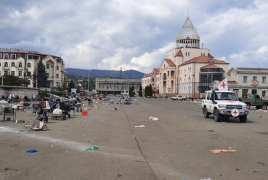
Civil society organizations defending the rights of forcibly displaced persons from Artsakh have issued a joint statement, strongly criticizing the Armenian Ministry of Foreign Affairs for suggesting that the Karabakh issue has been removed from the Armenia-Azerbaijan interstate negotiation agenda.
The statement emphasizes that the Karabakh issue cannot be excluded from discussions, as the forced displacement of over 150,000 ethnic Armenians from their historic homeland constitutes a clear act of ethnic cleansing. This, according to international law, cannot and should not be recognized as legitimate. The NGOs also denounce any attempt to frame diplomatic failure as a legal reality, stating that doing so effectively abandons the rights of the Karabakh Armenians and legitimizes Azerbaijan’s use of force.
The statement also stresses that under international humanitarian law, the rights of forcibly displaced peoples and their right to return must remain a priority on the international agenda until a fair solution is achieved. A unilateral declaration of the end of the conflict cannot serve as a legitimate legal basis.
The NGOs express concern that Armenia has failed to meet its obligation to defend the interests of the Karabakh Armenians and ensure their protection in international forums. As a result, they were forced to flee their historic lands. The statement refers to the “Decree on the dissolution of Nagorno-Karabakh” as lacking legal legitimacy and contrary to international law—especially since it was not officially published or registered in the unified legal database arlis.am.
The civil society network demands that Armenia’s Foreign Ministry immediately revise its stance based on both the Constitution and principles of international law. It calls for a firm reaffirmation that the protection of the rights, security, and return of the Karabakh Armenians remains a central element of Armenia’s foreign policy. It also urges these issues to be included as an inseparable part of Armenia-Azerbaijan peace negotiations.
Finally, the NGOs appeal to the international community—including the UN, the Council of Europe, the OSCE, and human rights organizations—not to recognize the results of ethnic cleansing and to demand that Azerbaijan respect international law and ensure the safe return of the Karabakh Armenians under international guarantees, monitoring, and protection mechanisms.
“Karabakh Armenians’ lives and future cannot be bargaining points in interstate negotiations. We demand justice, accountability, and the protection of our people’s rights in accordance with the norms and principles of international law,” the statement reads.
The Armenian MFA stated: “We have repeatedly emphasized that Armenia was working in negotiations with Azerbaijan to ensure the rights and security of the Armenians of Nagorno-Karabakh, including the creation of an international mechanism to address these issues. This also included efforts to organize meetings between representatives of Nagorno-Karabakh and Azerbaijan in third countries, which were rejected by the Nagorno-Karabakh side. Following the forced displacement and the publication of the dissolution decree, the issue has exited the agenda of interstate relations between Armenia and Azerbaijan.”

